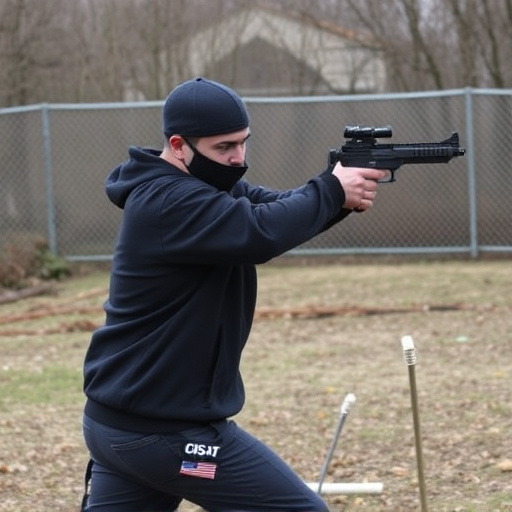Taser vs Stun Gun: Features, Differences & Benefits for Security Companies
Wholesale stun guns, or electronic control devices (ECDs), offer security companies a cost-effective…….
Wholesale stun guns, or electronic control devices (ECDs), offer security companies a cost-effective and accessible solution for personal security and crowd control. These non-lethal weapons use electric shock to temporarily incapacitate targets, providing crucial seconds to disable attackers and reducing injury risk. While Tasers (CEDs) disrupt muscle control with electrical current, stun guns deliver stronger but shorter-duration shocks through metal prongs. Security companies should consider legal implications and local requirements when selecting between these options, as proper training is essential for safe deployment. Bulk purchasing from wholesalers further reduces costs, ensuring a consistent supply of valuable assets for diverse settings.
“Uncover the distinct world of personal defense tools with our comprehensive guide on Tasers vs. Stun Guns. From understanding the unique capabilities of each device to exploring their key differences, this article is your navigation tool.
We delve into ‘Understanding Tasers’ to shed light on their innovative technology and impact. Then, discover ‘Stun Guns: Features and Functionality’ for a deeper insight.
For security companies seeking effective solutions, our piece highlights the benefits and considerations of wholesale stun guns, offering a strategic perspective in ‘Wholesale Stun Guns for Security Companies’.”
- Understanding Tasers: A Comprehensive Overview
- Stun Guns: Features and Functionality
- Key Differences Between Tasers and Stun Guns
- Wholesale Stun Guns for Security Companies: Benefits and Considerations
Understanding Tasers: A Comprehensive Overview

Tasers, officially known as Conductivity Energy Devices (CEDs), are non-lethal weapons designed to temporarily incapacitate individuals through the use of an electric current. They fire two small probes connected to wires, which deliver a powerful electrical pulse to the target’s muscles, causing them to contract uncontrollably and leading to a loss of balance and mobility. This technology has been widely adopted by law enforcement agencies worldwide for its effectiveness in subduing resistant subjects without resorting to lethal force.
In the context of security companies seeking wholesale stun guns, understanding Tasers is paramount. These devices offer a unique advantage in crowd control and personal protection. Unlike traditional stun guns that use high-voltage, low-current electricity to stun a target, Tasers employ lower voltage but higher current, ensuring precise muscle control without causing permanent damage or significant pain. This distinction makes Tasers suitable for scenarios where non-lethal force is required, making them valuable assets for security professionals in diverse settings.
Stun Guns: Features and Functionality

Stun guns, also known as electronic control devices (ECDs), are non-lethal weapons designed to incapacitate a target through electric shock. They operate by delivering a strong electrical current through two prongs or probes, disrupting muscle control and causing temporary paralysis. Stun guns are popular among personal security details and law enforcement for their effectiveness in neutralizing threats without the risk of permanent harm. Key features include a trigger mechanism, adjustable voltage settings, and a built-in safety switch to prevent accidental activation.
When it comes to wholesale stun guns for security companies, these devices offer several functional advantages. They are generally more affordable than tasers, making them an accessible option for businesses looking to equip their guards. Stun guns are also easier to operate due to their straightforward design, requiring simply pressing the trigger to deploy the shock. Additionally, their smaller size and weight make them convenient for carrying in pockets or attached to belts, ensuring quick access during emergencies.
Key Differences Between Tasers and Stun Guns

When comparing Tasers and stun guns, several key differences stand out, especially for security companies considering wholesale stun guns for their operations. Tasers, officially known as Electronic Control Devices (ECDs), primarily use electrical current to disrupt muscle control in a target, causing temporary incapacitation. This makes them highly effective at neutralizing resistant individuals without the need for physical force. On the other hand, stun guns emit a strong electric shock through metal prongs or contacts, overloading the nervous system and leading to muscle spasms and disorientation.
While both weapons aim to subdue an opponent, stun guns typically deliver a more intense shock but with shorter duration than Tasers. Stun guns are also often easier to use due to their simple design, making them a preferred choice for personal defense. However, security companies should consider the legal implications and specific requirements of their jurisdiction when choosing between these two non-lethal force options.
Wholesale Stun Guns for Security Companies: Benefits and Considerations

Security companies often require effective tools to ensure the safety of their personnel and the public. In this regard, wholesale stun guns for security companies offer a robust solution. Stun guns, also known as electronic control devices (ECDs), use an electric current to temporarily incapacitate a target, providing crucial seconds for security guards to escape dangerous situations or subdue attackers.
When considering wholesale stun guns for security companies, several benefits emerge. Firstly, they provide a non-lethal means of force, reducing the risk of serious injury or death during encounters. This is especially important in high-stress, dynamic work environments where quick decision-making is essential. Secondly, stun guns are relatively inexpensive compared to other types of defense equipment, making them an affordable option for security companies with budget constraints. Moreover, bulk purchasing from wholesalers allows businesses to secure better deals and maintain a consistent supply, ensuring their staff is always equipped. However, security companies must also consider the legal implications and training requirements associated with deploying stun guns, as proper usage and awareness of local regulations are paramount.
In conclusion, both tasers and stun guns serve as effective non-lethal force tools, but they differ significantly in their operation, range, and effectiveness. Tasers utilize electrical current to disrupt muscle control, while stun guns emit a powerful electric pulse to temporarily disable an individual. For security companies seeking reliable options, wholesale stun guns present numerous benefits, including cost-effectiveness, ease of use, and quick deployment. When chosen based on specific needs and proper training, these tools can greatly enhance safety measures.


